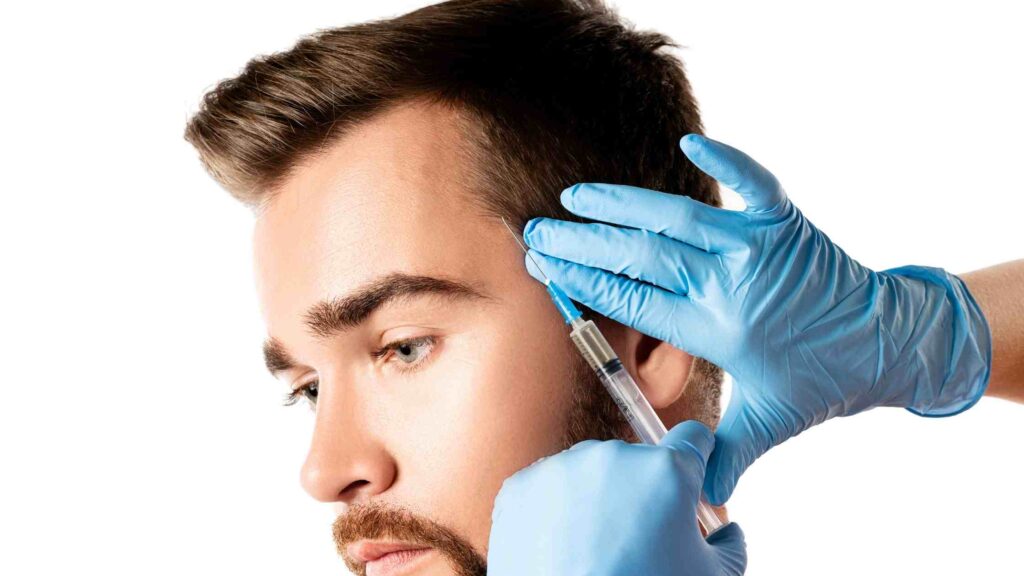Behind every acne, there is a clogged pore. When the oil secreted by our face mixes with the dead skin cells, they clog the pores causing whiteheads and blackheads. And that is how nodular acne occurs. But there is one thing that gets trapped alongside dirt and oil and makes nodular acne different from other types of acne; a bacteria called Cutibacterium acnes. When that specific bacteria get trapped under the skin, especially those nodules, it leads to inflammation and infection.
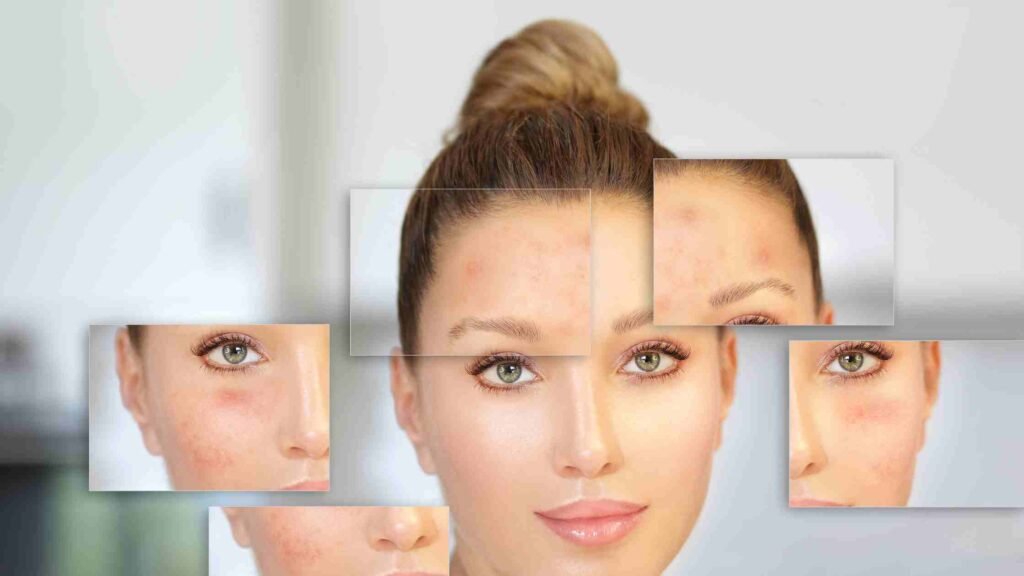
Nodular acne is a severe type of inflammatory acne that causes a hard lump or nodule to develop under the skin. The nodule starts developing below the skin’s surface and appears on the skin as red bumps. The difference between regular and nodular acne is that nodular acne doesn’t appear with any whitehead or blackhead at the center. This persistent type of acne lasts for a week and even months causing pain to the sufferer.
Nodular acne does not go away on its own. Therefore it requires treatment from a skincare provider or dermatologist to avoid this type of acne leading to permanent and severe scarring.
In this article, we will talk about all the possible treatment options for nodular acne alongside some skin care tips for you to subside the symptoms of nodular acne.
How Nodular Acne Looks Like?
Acne has been a prevalent skin condition among people from every gender since they touch their adolescence. Nodular acne is not like regular acne, not even by its appearance. This type of acne appears like a small bump under your skin or can also be skin toned with redness, and the surrounding area of the acne gets inflamed. As we mentioned, earlier nodular acne does not have a head like all the other types of acne and is painful when touched.
Are Nodular Acne And Cystic Acne The Same?
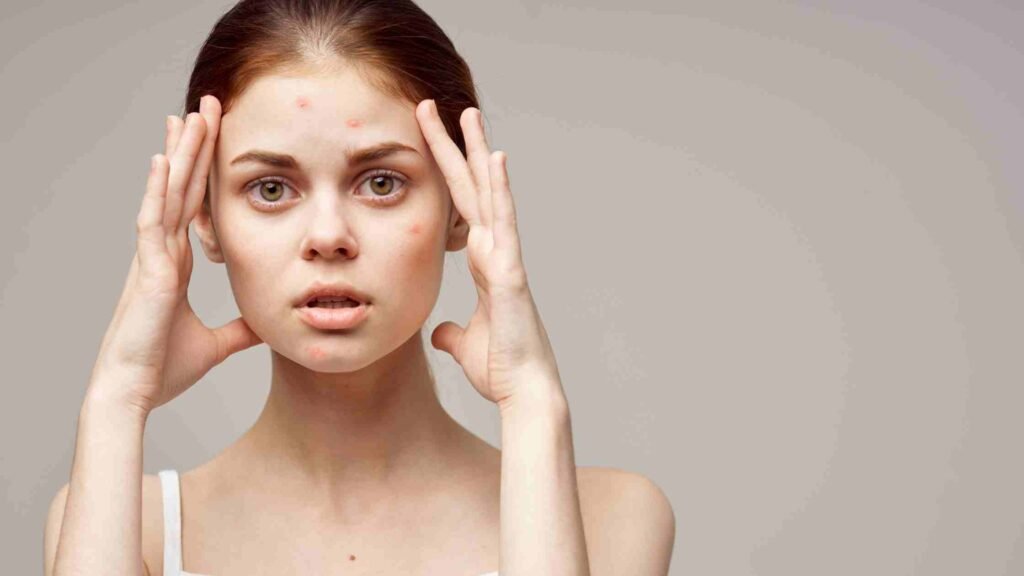
Well, we know that from the description of the appearance of nodular acne, many might think that nodular acne is the same thing as cystic acne. Though acne is the most severe form and develops deep underneath the skin, they are different.
When a person suffers from cystic acne the acne looks red and develops large boils. The cyst-like nodule develops deep inside the skin’s surface, filling the nodules with pus. For being pus-filled cystic acne is way softer than nodular acne. Cystic acne occurs when white or black head content spills into the surrounding skin areas. In contrast, nodular acne, whether it is intact under the skin or skin tone, doesn’t spill any content instead the content hardens into deep cysts.
What Are The Common Causes Of Nodular Acne?
Nodular acne is also a type of pimple. Therefore it happens when the skin’s pores become clogged, trapping dead skin cells and oil that our body makes. The bacteria Cutibacterium acnes also get trapped causing infection pain and inflammation.
Blocked pores can result if your body excretes too much oil or if you don’t clean your skin properly. However, nodular acne can also occur from:
- Excessive sweating– If your skin sweats too much you are prone to nodular acne. People who wear clothing that traps sweat against their skin may also suffer from nodular acne. Some people who suffer hyperhidrosis, which causes excessive sweating, may also have a higher chance of developing nodular acne.
- Genetics– If you have a family history of nodular acne, you are more likely to develop it.
- Hormones-During adolescent development or puberty, young people are more likely to have acne breakouts as the hormone levels in their bodies change. When the hormone androgen increases its level it causes excessive oil saturation and leads to clogged pores. Menstruating people can also get nodular acne.
- Skincare products– Some skincare products including lotions, makeups, and creams can clog pores and lead to developing nodular acne. However, reapplying sunscreens and creams without cleaning the face may also lead to clogged pores and nodular acne.
- Certain medications– Certain drugs such as corticosteroids, can work in the condition of nodular acne.
- Stress– Increased anxiety and stress can also produce more cortisol, the stress hormone of your body that leads to the development of nodular acne.
Read more about How To Get Rid Of Milia Bumps?
How To Identify The Symptoms Of Nodular Acne?
As mentioned earlier regular acne and nodular acne are two different skin problems. Though nodular acne is a type of acne, it appears different. In regular acne where you can find white or blackheads, nodular acne is a blind pimple that starts underneath your skin and does not appear with a head. The symptoms of nodular acne include:
- You can feel a hard lump under your skin. People assigned males at birth usually experience nodular acne on their faces, chest, or back. And people who are assigned female at birth can experience nodular acne development on their chin and jawline.
- Sensitivity and pain when touched.
- Red and raised lumps or sometimes even in the same color as your skin
If you suspect you are nodular acne, you must talk to a dermatologist or skincare provider for diagnosis and treatment.
How Is Nodular Acne Diagnosed?
A dermatologist has years of experience diagnosing nodular acne. Therefore they can identify whether the acne on your face is nodular just through a visual examination. If you are opting for an online consultation share all the symptoms you are experiencing. Your dermatologist might ask you a few questions regarding the pain level and the area of occurrence. It would help if you also inform your dermatologist about any medications you are taking to help them discover the cause of nodular acne.
The Best Possible Nodular Acne Treatment Options
Since other types of acne and nodular acne are different, over-the-counter acne products and not sufficient to treat and reverse nodular acne. However, some ingredients, such as salicylic acid and benzoyl peroxide, can only help shed the excess oil and dead skin cells at the surface. Therefore some products including those contents can be helpful. Using those products can help clear up the clogged pores at the skin’s surface, but it will not help much if the acne is deeply rooted underneath the skin. Talking to a health care provider to know the best possible treatment options is better. They might recommend one or a combination of a few from the following.
Read more about What Is Acne Rosacea- Causes, Symptoms, Treatment Options & More
Oral Antibiotics
Since nodular acne is connected with bacteria on your skin, your dermatologist can recommend that you take oral antibiotics to clear up the bacteria. Nodular acne tends to reoccur even after treatment and every time you suffer from nodular acne, you must take oral antibiotics if your dermatologist recommends it. Oral antibiotics clear up the bacteria so that it does not get trapped under the pores and lead to the development of nodular acne. Moreover, the medicines can also reduce the pain and inflammation associated with nodular acne.
Topical Solutions
Alongside taking oral medications your dermatologist can suggest some over-the-counter topicals to apply directly to the acne nodules. Both the steps we discussed until now are preferred first steps for creating nodular acne especially when you have only a few nodules at a time.
The dermatologist or skincare provider may suggest topical solutions containing salicylic acid or benzoyl peroxide in different concentrations to dry out the dead skin and oil trapped in the nodule. Retinoids are also prescribed as it is potent to unclog trapped hair follicles.
Cosmetic Procedures For Treating Nodular Acne
In most cases, oral medications or topical solutions are insufficient for treating nodular acne. Since nodular acne differs from other types of acne, it requires a different approach to treatment. Therefore, some cosmetic procedures are used by dermatologists to be proven and trusted for the treatment.
However, your dermatologist may also combine the prescription medications with the cosmetic procedures below to reduce the bacteria and inflammation and prevent scars.
Read more about How To Reduce Body Heat Pimples
Acne Extraction
Acne extraction is a procedure in which the clogged pore is cleared with the help of medicated and sterile tools. Many facials also involve performing this technique to get rid of problem pimples. However, getting it done by a dermatologist is always recommended to stay safe against severe repercussions.
The acne extraction procedure removes all the unwanted debris inside the pores including makeup, dirt, and excess oil. When you go to a dermatologist’s office for acne extraction the entire treatment is done with utmost care.
At first, the dermatologist cleans your face and then applies an enzyme with steam to soften the nodular acne and the skin for easier extraction. They extract the acne under a magnifying lamp with a bright light so that they can see your pores. The dermatologist may apply gentle pressure around the pore to extract the inside content. However, some pores might not be ready for extraction during the first treatment session. Therefore some people might need several acne extraction treatment sessions to clear out nodular acne completely.
Some dermatologists also customize the treatment by combining other cosmetic procedures such as microdermabrasion and facial or suggest a home skin care regimen of natural products.
Read more about Best Way To Get Rid Of Blind Pimple
Chemical Peeling
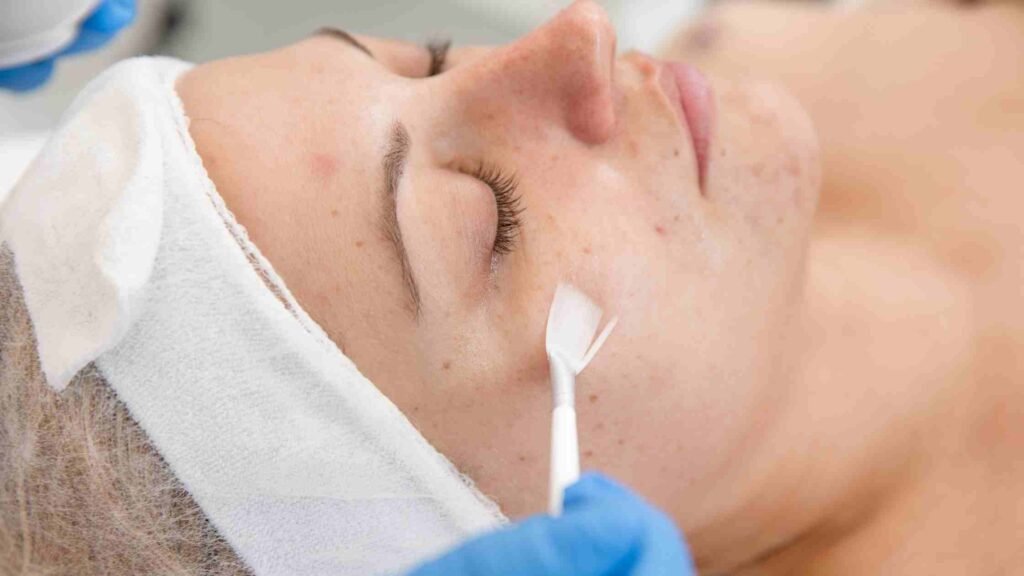
Though chemical peeling treatment sounds very harsh and challenging, it is probably the safest and proven cosmetic treatment for many skin problems, including nodular acne. In chemical peel treatment, unique acid solutions are used and applied to your face by a board-certified dermatologist or certified skin care provider. The treatment aims to remove the top layer of your skin over a few weeks to reveal smooth and healthier skin underneath. For decades, chemical peel treatment has been used to treat nodular acne alongside other skin conditions such as hyperpigmentation, age spots, melasma, fine lines, wrinkles, and acne scars.
The chemical peel treatment is done in several sessions. Since the chemical solutions used in this treatment can reach deep layers of the skin, your dermatologist might suggest this treatment to you for nodular acne treatment. Your dermatologist will use different types of peels at different concentrations based on the targeted layer of the skin.
Different peels have different effects on the skin and the most common types of peels dermatologists used for treating nodular acne are:
- A superficial peel that can target the top layer or the epidermis. Superficial peels have minimal downtime; therefore, they are also called lunchtime peels since the treatment can be done within a lunch break. This peel can be sufficient at the initial stage of nodular acne development.
- Medium peels can go deeper into the epidermis and impact some parts of the dermis. If your face has several nodular acne, medium-depth peels can be suggested to you.
- A deep chemical peel is used for severe skin conditions. In the case of nodular acne, when your face has many nodular acne with pus-filled lumps, your dermatologist targets the dermis with a deep chemical peel. Deep chemical peels are performed under anesthesia and your dermatologist might suggest extensive skincare before and after the procedure.
For better results, your dermatologist might perform several sessions of the chemical peel over several weeks, and some peels might require an extended healing period. However chemical peel treatment can keep your nodular acne at bay for a long time.
Laser Therapy
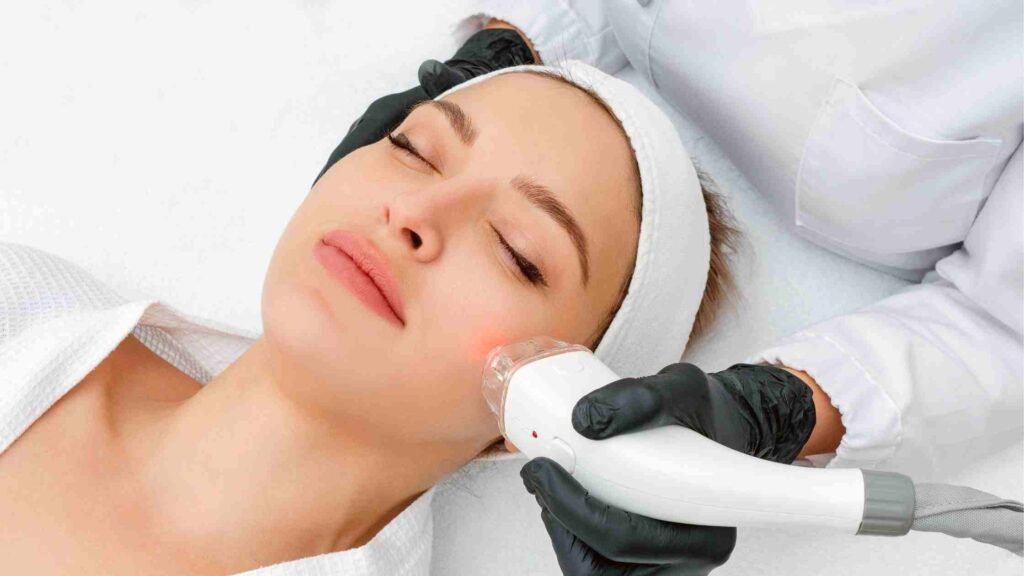
Due to the lack of expected remission and potential side effects of many other treatments, dermatologists prefer lasers and light devices for treating nodular acne. Laser and light therapies include using a variety of light and laser devices, including potassium titanyl phosphate laser, 1450 nm diode laser, 585 and 595 nm pulsed dye lasers, intense pulsed light sources, radiofrequency devices, and more.
All the devices mentioned above are believed to target the underlying pathogens of nodular acne and the management of acne scarring. In recent years laser therapy has become an established alternative to any traditional topical and oral medications for treating nodular acne. Lasers can reduce inflammatory acne by targeting some pathophysiologic influences such as sebaceous gland activity and reducing inflammation.
During the treatment procedure, the dermatologist uses a hand-held laser device to remove the top layer of the skin and damage the development of nodular acne underneath the skin’s surface. Since the development of this type of acne breaks apart with the help of heat and light, healthy skin cells grow and your skin appears to be soft and smooth.
Injections
To reduce the pain, inflammation, and swelling of nodular acne, dermatologists inject a diluted corticosteroid into the nodule. This treatment is also called a cortisone shot. But for this injection to work on your acne, the acne must be tender with swollen nodules. In many cases, corticosteroid injections are found effective in shrinking the nodules.
Corticosteroid injections are made of synthetic hormones and are used for short-term relief from the inflammation of nodular acne. The injections can be used on any body part where the acne has occurred. And the dermatologists inject the content directly into the acne nodule containing a small amount of steroid such as triamcinolone.
Your dermatologist might suggest several injections in one session and multiple sessions in 6 weeks. Corticosteroid injections are best for occasional treatment for specific acne nodules and they must not be in your regular skin care regimen.
How To Prevent Nodular Acne
Prevention is better than cure. And in the case of managing nodular acne, the same saying fits perfectly. Since over-the-counter acne creams are ineffective in treating nodular acne and require a dermatologist’s treatment, one must take good care of the skin to prevent nodular acne. However, people who derived nodular acne problems genetically may not be able to prevent nodular acne. But still, you can reduce the chance of getting it by practicing good hygiene.
To prevent nodular acne, one should:
- Wash the face twice daily with gentle foaming face wash. If you exercise in the middle of the day, a quick wash with a cleanser can help prevent the accumulation of bacteria and clogged pores. Remember, one must only wash the face with the face wash only twice, and for the rest of the time, using cleansers is highly recommended.
- Remove makeup before bed. This practice reduces the amount of oil and bacteria that build up on the skin and causes nodular acne.
- Apply lightweight products such as lightweight moisturizers, sunscreen, etc. Moreover, if you want to reapply any product on your skin it is always suggested to use a cleanser before the re-application to avoid clogged pores.
- Use a face mask like a clay mask twice a week to eliminate excessive oil secretion and dead skin cells. Clay masks are also a natural anti-inflammatory and prevent bacteria from entering the pores.
- Apply a good sunscreen of at least SPF 30 before stepping out in the sun. If your doctor has suggested, you use retinol, using sunscreen is even more mandatory to prevent sunburn.
- Please don’t touch your face, especially when they are not cleaned. Dirty hands transfer bacteria onto your skin and increase the chance of nodular acne.
- Always wash your hands before applying any product to your face to avoid contamination.
When To See A Dermatologist When Affected With Nodular Acne?
It is difficult to get rid of nodular acne with any home remedy. The skin care habits we mentioned above, alongside resisting the urge to pop acne nodules, can help you from worsening the situation. However, it is always better to see a dermatologist when you notice nodular acne accumulation on your face to get professional advice and treatment.
Remember, when you proactively work on treating nodular acne at the initial stage of development, you can stay protected against the risk of acne scars. If your doctor has suggested some OTC products that do not seem to work, you can contact your dermatologist for professional cosmetic treatments.
See a dermatologist if you have recurring cases of nodular acne and if the acne on your skin is excessively painting.
Conclusion
Moderation and regularity in your daily lifestyle are good practices to deal with many health problems, including skin issues like nodular acne. Therefore eating healthy and drinking much water are some of the mandatory tips one must abide by to deal with acne problems. However, if you are suffering from nodular acne, you must follow a cleansing and skin care regimen that keeps your skin clean and hygienic. But remember, you must not use any exfoliating cleansers and products. I hope this article helps you get enough details about nodular acne and how to deal with it when it occurs. Keep following has for many such helpful articles in the future.
